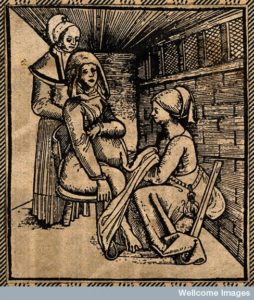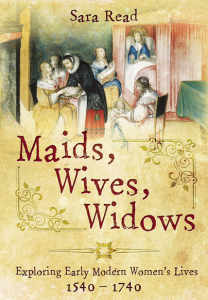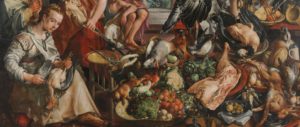
Tuesday 5 May 2020 is International Day of the Midwife, which falls during the World Health Organisation’s Year of the Nurse and Midwife making it a double celebration.
Midwifery and childbirth is something we’ve discussed a few times on this blog, but did you know Sara has just published her debut novel on this very subject? The Gossips’ Choice takes its name partly from the gossips who attended births and helped women through their labours. You can see a gossip standing behind the labouring mother on the chair in the image below. Her midwife is seated in front of her ready to receive the infant.
Back in the 1600s, registered midwives didn’t obtain licences to practise through degree-level study like nowadays, instead they had to obtain permission and recognition from the Bishop via their parish church.

Once a woman had served as a deputy or apprentice to a midwife for a number of years and could gather together character references and testimonials from mothers she had assisted, she could apply to take the oath which had to be administered by a bishop or his chancellor. The oath printed in the 1649 in The Book of Oaths [1] had 15 points (which you can read underneath this post) but not every bishop insisted on them all. Most of the promises were concerned with the midwife keeping high ethical standards and being honest in her dealings: not leaving a poor woman for a wealthy client, not colluding with women to name a man the father falsely, not giving out abortion-inducing herbs, disposing of the body of stillborn infants in an appropriate place and so forth.
Read an excerpt from The Gossips’ Choice below
Having cut the cord, Lucie applied a few ashes from a burned linen rag to the open end and sealed it with a fresh piece of linen.
‘We don’t want the cold getting into your belly, do we, young man?’ she cooed to the baby, as she went through the necessary processes.
In the corner of the room the Jones’s dog had recently whelped and was busily licking her pups to toilet them.
‘’T’would be much simpler if we could bring forth our babes as easily as the beasts do,’ Jane said ruefully.
Lucie looked up.
‘That’s very true,’ she said, ‘but as we know, the curse from our first mother’s sin means the burden of childbirth falls much more heavily on us.’
Her next task was to bathe the infant gently in warm wine, and then she stroked down his belly to encourage him to pass his first water, and examined his fundament before wrapping him in soft clothes. In swaddling him, Lucie made sure all his limbs were straight and in the right places. Having had the filth picked from his nose, the infant was deemed ready to be placed in his cradle.
Mary had also finished attending to Anne, who was quietly jubilant, looking forward to telling her husband he had another son. Due to Mary’s fine care she had not torn or injured herself, so was likely to recover quickly.
‘Who will suckle the baby while your good milk comes, Anne?’ Mary asked.
‘I will,’ replied Jane Croft. ‘My boy is four months old and I can easily nurse this new lad alongside my own for a couple of days. Anne will return the favour next time, I’m sure.’
Living hard-by one another in the weavers’ cottages, the women of Warley Lane rarely had to resort to feeding water or asses’ milk to their newborns while they waited for their good milk to come in.
‘Ah yes, Jane, how does little Matthew do?’ asked Lucie. ‘He was a fine boy when we birthed him and I thought he was like to do well.’
‘Oh, he is strong and very contented, Mistress Smith. Last month he was troubled with some sores on his breech. But Mister Smith sold me some unguent for sixpence for them, and now he’s as happy as a king.’
Sara’s debut novel which is available now.
If you order it from the publisher directly you will receive a complimentary copy of Sara’s pamphlet, A Handy Guide to Pregnancy.
______________
[1] Garnet, Richard, S.J, The book of oaths, and the severall forms thereof, both antient and modern. Faithfully collected out of sundry authentike books and records, not heretofore extant, compiled in one volume (London, 1649), pp. 284-90.

You can read the whole of Richard Garnet’s wording of the midwife’s oath below:
The Oath that is to be ministred to a Midwife by the Bishop … when she is licensed to exercise that Office of a Midwife.
1. YOu shall sweare, First, That you shall be diligent and faithfull, and readie to helpe every Woman labouring of Childe, as well the poore as the rich; and that in time of nessitie, you shall not forsake, or leave the poore woman, to go to the Rich.
2. Item [also], Yee shall neither cause nor suffer any woman to name, or put any other Father to the Childe, but onely him which is the very true Father thereof indeed.
3. Item, You shall not suffer any woman to pretend faine, or surmize her selfe to be delivered of a Childe, who is not indeed; neither to claime any other womans Childe for her owne.
4. Item, You shall not suffer any Womans Childe to be murthered, maymed, or otherwise hurt, as much as you may; and so often as you shall perceive any perill or jeopardie, either in the Woman, or in the Childe, in any such wise, as you shall bee in doubt what shall chance thereof, you shal thenceforth in due time send for other Midwives, and expert women in that facultie, and use their advice and counsell in that behalfe.
5. Item, That you shall not in any wise use or exercise any manner of Witchcraft, Charme; or Sorcery, Invocation, or other Prayers than may stand with Gods Laws and the Kings.
6. Item, You shall not give any counsell, or minister any Herbe, Medicine, or Potion, or any other thing, to any Woman being with childe whereby she should destroy or cast out that she goeth withal before her time.
7, Item, You shall not enforce any Woman being withchilde by any paine, or by any ungodly wayes or meanes, to give you any more for your paines or labour in bringing her a bed, then they would otherwise do.
8. Item, You shall not consent, agree, give, or keepe counsell, that any woman be delivered secretly of that which she goeth with, but in the presence of two or three lights readie.
9 Item, You shall be secret, and not open any matter appertaining to your Office in the presence of any man, unlesse necessity or great urgent cause do constraine you so to do.
10. Item, If any childe bee dead borne, you your selfe shall see it buried in such secret place as neither Hogg nor Dogg, nor any other Beast may come unto it, and in such sort done, as it be not found nor perceived, as much as you may; And that you shall not suffer any such childe to be cast into the Jaques [toilet] or any other inconvenient place.
11. Item, If you shall know any Midwife using or doing any thing contrary to any of the premisses, or in any otherwise than shall be seemely or convenient, you shall forthwith detect open to shew the same to me, or my Chancellor for the time being.
12. Item, You shall use your selfe in honest behaviour unto the woman being lawfully admitted to the roome and Office of a Midwife in all things accordingly.
13. Item, That you shall truly present to my selfe, or my Chancellor, all such women as you shall know from time to time to occupie and exercise the roome of a Midwife within my foresaid Diocesse and Jurisdiction of A. without my License and admission
14. Item, You shall not make or assigne any Deputie or Deputies to exercise or occupie under you in your absence the Office or roome of a Midwife, but such as you shall perfectly know to be of right honest and discreet behaviour, as also apt, able, & having sufficient knowledge and experience to exercise the said roome and Office.
15. Item, You shall not bee Privie, or consent, that any Priest, or other partie, shall in your absence, or in your companie, or of your knowledge or sufferance, Baptise any child, by any Masse, Latine-Service, or Prayers then such as are appointed by the Lawes of the Church of England; neither shall you consent, that any child, borne by any woman, who shall be delivered by you, shall be carried away without being Baptised in the Parish by the Ordinarie Minister, where the said child is borne, unlesse it be in case of necessitie. Baptised privately, according to the Booke of Common Prayer: But you shall forthwith upon understanding thereof, either give knowledge to me the said Bishop, or my Chancell our for the time being All which Articles and Charge you shall faithfully observe and keepe, so help you God and by the contents of this Booke.




Congratulations Sara on the publication of The Gossips’ Choice. I found your research absolutely fascinating and was delighted to see you have put it to good use in the form of a novel. I look forward to reading it myself but also passing it on to anyone with an interest in the profession of midwives in the seventeenth century.
I have just started reading it myself and I’m thoroughly enjoying it – hope you do to! Jennifer
Thank you very much Ursula! That’s very kind of you. I hope you enjoy it. Sara
I’ve ordered a copy and look forward to reading it. I will pass it on to Dr Diana Jefferies, midwife and nursing teacher but also medieval specialist in post natal psychosis in Margery Kemp, plus a couple of gynaecologist friends. I’m sure they will find it interesting.